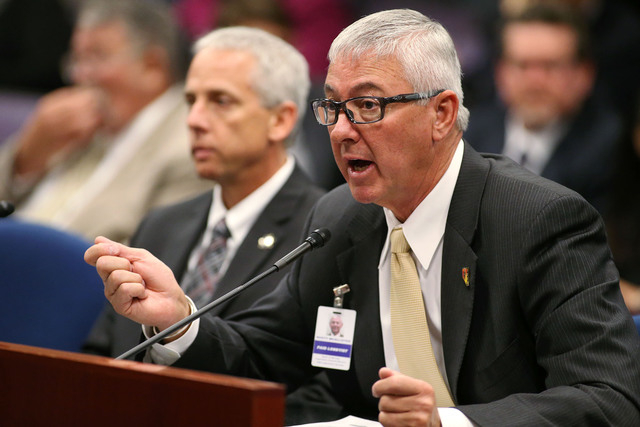Labor wants all public contract details revealed in Nevada

CARSON CITY — Labor groups said Friday if lawmakers want to require local governments to publicize proposed union contracts before ratifying them, the mandate should be extended to all contracts.
Senate Bill 158, which has already been approved by the Senate, was heard by the Assembly Commerce and Labor Committee. It would require local governments to reveal details and background materials on contracts with public employee bargaining groups three days before a vote.
State Sen. Pete Goicoechea, R-Eureka, said the bill is “truly an effort to bring transparency to collective bargaining” and inform the public “what you bargained for and what you settled for.”
The measure was supported by local governments, business groups and the Las Vegas-based conservative think tank Nevada Policy Research Institute.
“The public has a right to see the bill before taxpayers are paying it,” said NPRI’s Victor Joecks.
Union representatives agreed with the idea behind the bill but said it doesn’t go far enough.
“We’re actually in support of the concept of the bill,” said Rusty McAllister with the Professional Fire Fighters of Nevada. “We have no problem with putting our documentation out online.
“But we also believe, let’s not just talk about public employee organizations. Managers, supervisors … those contracts never see the light of day,” he said.
“If the public has the right to know, we agree. Let’s do it. But let’s do it for everybody,” McAllister said.
An effort to amend the bill with that requirement failed in the Senate.
Others complained Friday that local governments routinely approve contracts worth millions of dollars on consent agendas, where numerous items are approved with a single vote and without discussion.
That raised concerns by Assemblywoman Marilyn Kirkpatrick, D-North Las Vegas, who said lawmakers passed legislation a decade ago requiring evaluations of supervisors and administrators to be public.
Goicoechea agreed.
“I’m saying that is the law now,” he said. “So putting it in this bill, does that help?’
The committee also debated Senate Bill 168, which seeks to define a “fiscal emergency” that could trigger reopening of collective bargaining pacts.
Under the bill, presented by state Sen. James Settelmeyer, R-Minden, a fiscal emergency would occur if a local government’s general fund revenue falls 5 percent or more from the preceding year, or the ending fund balance drops to 4 percent of actual expenditures in the previous year.
Additionally, the bill would set aside 25 percent of a local government’s budgeted expenditures from labor negotiations and states those funds cannot be considered by an arbitrator when determining a local’s government’s ability to pay union-bargained compensation.
The percentage under current law is 8.3 percent.
Critics of the bill including some Democratic lawmakers said the bill could allow governments to divert money from their general coffers into other funds to declare an emergency and reopen bargaining.
The committee took no action on either measure.
Contact Sandra Chereb at schereb@reviewjournal.com or 775-687-3901. Find her on Twitter: @SandraChereb.